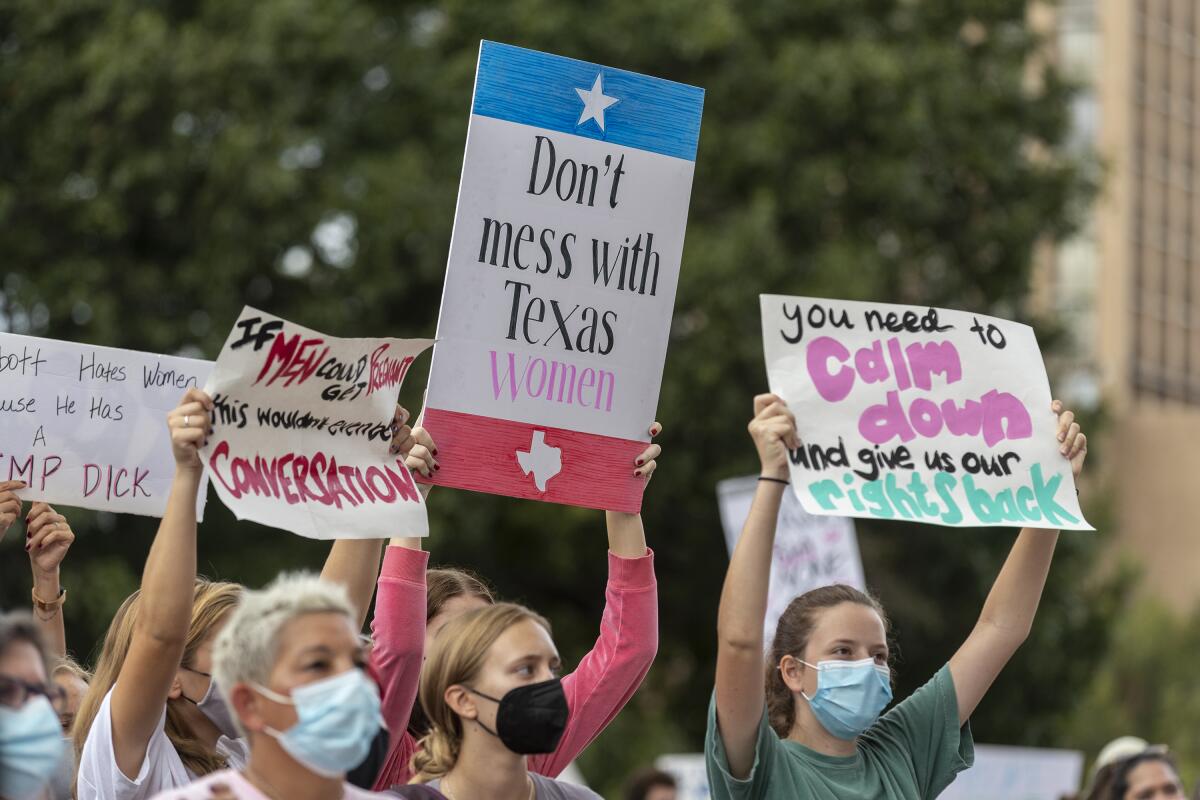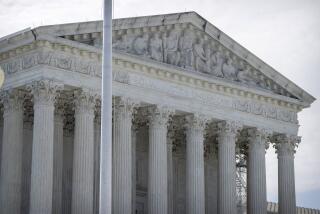U.S. appeals court temporarily lets Texas abortion law take effect again

- Share via
AUSTIN, Texas — A federal appeals court Friday night allowed Texas to temporarily resume banning most abortions, just one day after clinics across the state began rushing to serve patients again for the first time since early September.
Abortion providers in Texas had been bracing for the 5th U.S. Circuit Court of Appeals to act quickly, even as they booked new appointments and reopened their doors during a brief reprieve from the law known as Senate Bill 8, which bans abortions once cardiac activity is detected, usually around six weeks of pregnancy.
On Wednesday, U.S. District Judge Robert Pitman, an appointee of President Obama, issued an order suspending the Texas law that he called an “offensive deprivation” of the constitutional right to an abortion. But in a one-page order, the New Orleans-based appeals court temporarily set aside Pitman’s ruling for now while it considers the state’s appeal.
The court gave the Biden administration, which had brought the lawsuit, until Tuesday to respond.
The Center for Reproductive Rights, which represents several Texas abortion providers, urged the U.S. Supreme Court to “step in and stop this madness.”
A judge’s ruling blocking the new Texas abortion law lays out how malevolent it is.
“Patients are being thrown back into a state of chaos and fear,” said Nancy Northup, the organization’s president.
Texas had roughly two dozen clinics performing abortions before the law took effect Sept. 1, and not all Texas abortion providers resumed services while it was on hold. Many physicians had feared a swift reversal from the appeals court that risked putting them back in legal jeopardy.
The new law threatens Texas abortion providers with lawsuits from private citizens, who are entitled to collect at least $10,000 in damages if successful. That novel approach is the reason why courts had not blocked the law before Pitman’s ruling, because the state plays no role in enforcing the restrictions.
The 5th Circuit allowed the law to take effect in September and stepped in this time only hours after Republican Texas Atty. Gen. Ken Paxton’s office urged it to act.
His office told the court that because the state does not enforce the law, it cannot “be held responsible for the filings of private citizens that Texas is powerless to prevent.”
It is unclear how many abortions Texas clinics performed in the short time since the law was put on hold. On Thursday, at least six providers had resumed normal services or were gearing up to do so, according to the Center for Reproductive Rights.
Prior to Pitman’s blistering 113-page order, other courts had declined to stop the law, which bans abortions before some women even know they are pregnant. That includes the 5th Circuit and the U.S. Supreme Court, which allowed the law to move forward in September without ruling on its constitutionality.
One of the first providers to resume normal services was Whole Woman’s Health, which operates four clinics in Texas.
A judge’s ruling blocking the new Texas abortion law lays out how malevolent it is.
Amy Hagstrom Miller, president of Whole Woman’s Health, said her clinics called in some patients early Thursday who were on a list in case the law was blocked. Other appointments were in the process of being scheduled for the days ahead, and phone lines were again busy. But some of the clinics’ 17 physicians were still declining to perform abortions, fearful they might be held liable despite the judge’s order.
Pitman’s order amounted to the first legal blow to Senate Bill 8, which had withstood a wave of earlier challenges. In the weeks since the restrictions took effect, Texas abortion providers said the effect had been “exactly what we feared.”
Pitman took Texas to task in his opinion.
“From the moment S.B. 8 went into effect, women have been unlawfully prevented from exercising control over their lives in ways that are protected by the Constitution,” wrote Pitman, who was appointed to the bench by President Obama.
Abortion providers say their fears have become reality in the short time that the law has been in effect. Planned Parenthood says the number of patients from Texas at its clinics in the state decreased by nearly 80% in the two weeks after the law took effect.
Some providers have said Texas clinics are now in danger of closing while neighboring states struggle to keep up with a surge of patients who must drive hundreds of miles for an abortion. Other women, they say, are being forced to carry pregnancies to term.
How many abortions have been performed in Texas since the law took effect is unknown. State health officials say additional reporting requirements under the law will not make September data available online until early next year.
A 1992 decision by the U.S. Supreme Court prevented states from banning abortion before viability, the point at which a fetus can survive outside the womb, around 24 weeks of pregnancy. But Texas’ version had so far outmaneuvered the courts because it leaves enforcement to private citizens to file suits, not prosecutors, which critics say amounts to a bounty.
More to Read
Sign up for Essential California
The most important California stories and recommendations in your inbox every morning.
You may occasionally receive promotional content from the Los Angeles Times.














